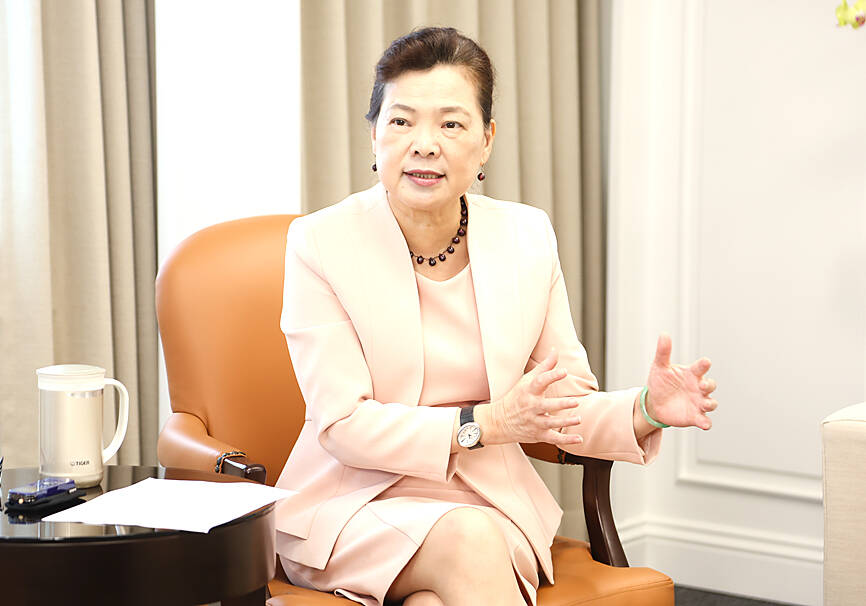US graphics chip designer Nvidia Corp is planning to relocate its Hong Kong-based logistics center to Taiwan, Minister of Economic Affairs Wang Mei-hua (王美花) said on Wednesday.
The government had been in discussions with Nvidia regarding tax incentives to facilitate the move since last year, Wang said in an interview with the Central News Agency, adding that the two sides had reached a consensus.
Wang did not provide details about the timetable for the move or the planned tax arrangements for Nvidia.

Photo: CNA
The relocation would boost the local economy, as Taiwan Semiconductor Manufacturing Co (TSMC, 台積電) is a major supplier of graphics processing units (GPUs) for Nvidia and many local computer makers are the US firm’s customers, Wang said.
Nvidia’s decision showed that cross-strait tensions do not deter global tech companies from choosing Taiwan as a destination for investment, the minister said.
It is unclear whether the relocated logistics center would be involved in the distribution of components to Nvidia’s partner plants or finished products.
Founded in 1993 by Jensen Huang (黃仁勳) in California, Nvidia is a designer and producer of GPUs, chips and related multimedia software.
The announcement came days after Dutch chipmaking equipment supplier ASML Holding NV said it would bolster its local operations by offering at least NT$1.6 million (US$51,568) in starting annual pay to engineers with a master’s degree at its sites in Taiwan.
The major supplier to TSMC said it is keen to offer competitive compensation comprised of salaries, bonuses and other financial incentives as it seeks to expand its talent pool in Taiwan.
Those multinational companies’ investments in Taiwan indicate the nation’s crucial role in the world’s semiconductor supply chain, Wang said.
Commenting on concerns about whether TSMC’s investment in the US to make chips on 3-nanometer and 5-nanometer technologies would lead to Taiwan losing technological competitiveness, as Japan did when local tech companies expanded abroad, Wang said that Taiwan is different from Japan.
Taiwan does not compete directly with the US, but the countries collaborate with each other, Wang said.
Taiwanese companies are good at providing chip manufacturing foundry services, while US companies are specializing in chip design, she added.
TSMC builds up US capacity to supply customers with locally manufactured chips, Wang said, adding that the Hsinchu-headquartered company seeks to diversify manufacturing sites to mitigate risks.
It is most important that TSMC is committed to investing in the most advanced chips in Taiwan, Wang said.
The chipmaker is ramping up 3-nanometer chipmaking technology at its fab in Tainan and is preparing to build a new fab in Hsinchu at which 2-nanometer technology would be used, Wang said.
The company might also build a fab in Taoyuan that would introduce its 1-nanometer technology, she said.
Taiwan remains the primary chip manufacturing site for TSMC, she added.

AIR SUPPORT: The Ministry of National Defense thanked the US for the delivery, adding that it was an indicator of the White House’s commitment to the Taiwan Relations Act Deputy Minister of National Defense Po Horng-huei (柏鴻輝) and Representative to the US Alexander Yui on Friday attended a delivery ceremony for the first of Taiwan’s long-awaited 66 F-16C/D Block 70 jets at a Lockheed Martin Corp factory in Greenville, South Carolina. “We are so proud to be the global home of the F-16 and to support Taiwan’s air defense capabilities,” US Representative William Timmons wrote on X, alongside a photograph of Taiwanese and US officials at the event. The F-16C/D Block 70 jets Taiwan ordered have the same capabilities as aircraft that had been upgraded to F-16Vs. The batch of Lockheed Martin

GRIDLOCK: The National Fire Agency’s Special Search and Rescue team is on standby to travel to the countries to help out with the rescue effort A powerful earthquake rocked Myanmar and neighboring Thailand yesterday, killing at least three people in Bangkok and burying dozens when a high-rise building under construction collapsed. Footage shared on social media from Myanmar’s second-largest city showed widespread destruction, raising fears that many were trapped under the rubble or killed. The magnitude 7.7 earthquake, with an epicenter near Mandalay in Myanmar, struck at midday and was followed by a strong magnitude 6.4 aftershock. The extent of death, injury and destruction — especially in Myanmar, which is embroiled in a civil war and where information is tightly controlled at the best of times —

China's military today said it began joint army, navy and rocket force exercises around Taiwan to "serve as a stern warning and powerful deterrent against Taiwanese independence," calling President William Lai (賴清德) a "parasite." The exercises come after Lai called Beijing a "foreign hostile force" last month. More than 10 Chinese military ships approached close to Taiwan's 24 nautical mile (44.4km) contiguous zone this morning and Taiwan sent its own warships to respond, two senior Taiwanese officials said. Taiwan has not yet detected any live fire by the Chinese military so far, one of the officials said. The drills took place after US Secretary

THUGGISH BEHAVIOR: Encouraging people to report independence supporters is another intimidation tactic that threatens cross-strait peace, the state department said China setting up an online system for reporting “Taiwanese independence” advocates is an “irresponsible and reprehensible” act, a US government spokesperson said on Friday. “China’s call for private individuals to report on alleged ‘persecution or suppression’ by supposed ‘Taiwan independence henchmen and accomplices’ is irresponsible and reprehensible,” an unnamed US Department of State spokesperson told the Central News Agency in an e-mail. The move is part of Beijing’s “intimidation campaign” against Taiwan and its supporters, and is “threatening free speech around the world, destabilizing the Indo-Pacific region, and deliberately eroding the cross-strait status quo,” the spokesperson said. The Chinese Communist Party’s “threats